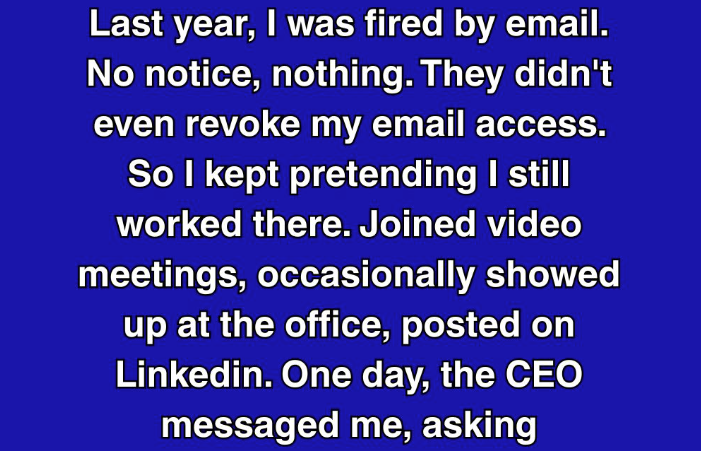Last year, an email abruptly ended my employment.
No warning, no explanation. My email access remained active. So, I continued as if nothing had changed. I joined virtual meetings, visited the office occasionally, and updated my LinkedIn profile. One day, the CEO sent me a message:
“Hey Reyan, who assigned you to spearhead the Jakarta project?”
I stared at my screen, puzzled. Jakarta project? That wasn’t my domain. I worked in operations. It had to be a mistake. Yet, I saw an opportunity I couldn’t ignore.
I responded:
“Thought it came from you. Arjun looped me in via Slack.”
That response bought me time. The CEO sent a thumbs-up emoji and wrote, “Let’s discuss Monday.” I had three days to unravel the mystery of the Jakarta project.
That weekend, I dove into old Slack conversations, documents, and project folders. The Jakarta initiative was a chaotic collaboration across operations, expansion, and procurement. No one fully owned it—scattered files, incomplete spreadsheets, and vague updates from multiple team leads defined it.
So, I did something I hadn’t done in months: I got to work.
I organized everything into a streamlined Notion dashboard, built a task tracker, and set tentative deadlines (which no one challenged). Then, I emailed the team: “Let’s align Tuesday. Created this dashboard for clarity.”
The team responded as if I were their leader. As if nothing had changed.
And in their reality, nothing had. No one knew I’d been terminated. Because, technically, I hadn’t. HR’s email was a mistake, meant for someone else. But instead of correcting it or apologizing, they ignored me.
Completely ignored. They seemed to expect I’d quietly disappear.
Instead, I made my presence undeniable.
I took charge of the Jakarta project as if it were mine from the start. I led weekly stand-ups, drafted status reports, and joined late-night calls with the Singapore office. The team flourished, surpassing its previous performance.
Months later, I received an invitation to a leadership retreat in Goa.
I suspected someone might know the truth. But no one acted like it.
So, I packed my bag and attended.
The retreat was at a seaside resort—palm trees, open bar, name tags with titles. Mine still read “Senior Ops Manager.” The CEO glanced at it during check-in and smiled as if everything were perfectly normal.
Over drinks that evening, he leaned in and said, “Reyan, I had doubts about Jakarta. You’ve turned it into something remarkable. Well done.”
I nodded, smiling as if I belonged. “Thanks. The team’s been incredible.”
Then he surprised me.
“Reyan, have you considered leading operations for the Asia region full-time? Post-Q4, we’ll need someone in Singapore.”
I froze.
Because here’s the reality: I had been fired. My salary had stopped. Severance ended after a month. I was surviving on savings, crashing on couches, borrowing money from my cousin without explaining why.
And now they were offering a promotion?
I replied vaguely, “Let’s discuss after the retreat.” That night, I barely slept.
I faced a choice.
Option one: Confess everything. Risk legal consequences, reputational damage, or worse.
Option two: Keep going. Hope no one verifies.
I chose a third path.
I made myself essential.
Over the next two months, I worked relentlessly. I reduced shipping times in Vietnam by 30%. I finalized a stalled deal with a challenging customs vendor in Malaysia. I slashed excess inventory costs in Manila. I practically lived in airports.
With every achievement, I sent detailed, results-focused updates. My inbox filled with gratitude from other departments.
By December, the CEO scheduled a call: “Next Steps – APAC Ops Lead.”
I entered that call prepared for anything.
He didn’t mention the firing. Didn’t even hint at it.
He simply said, “Let’s formalize this. We’ll update your compensation, have legal draft a regional contract, and relocate you to Singapore by March.”
That’s when I spoke up.
“There’s something I need to clarify first.”
I explained everything—the mistaken email, HR’s silence, my choice to keep working because I didn’t know what else to do.
I braced for anger.
Instead, he rubbed his face and laughed.
“You mean we accidentally fired you… and instead of suing us, you transformed our weakest region?”
I nodded.
He shook his head. “That’s the most dedicated thing I’ve seen in a decade. I owe you an apology.”
He called Legal on the spot, put me on speaker, and said, “Draft Reyan a new contract. Backpay from the date of HR’s error. Include a bonus. Then address whoever caused this oversight.”
I was speechless.
By week’s end, I had a signed regional director contract, a six-figure backpay deposit, and an apartment lined up in Singapore.
But the story doesn’t end there.
Two months into my new role, a new HR VP joined—Nayeli, a sharp leader from a São Paulo fintech startup. In our first meeting, she asked, “How many other HR errors like yours are hidden here?”
That question triggered a company-wide audit.
We discovered numerous mishandled terminations, unpaid contractors, and unresolved harassment complaints. It was a disaster.
So, I volunteered to assist—not because it was my responsibility, but because I understood what it felt like to be overlooked by a system meant to support you.
Together, we redesigned reporting structures, streamlined contractor payments, and reinstated three junior employees who’d been wrongfully terminated.
It became the most fulfilling chapter of my career.
Now, a year later, I reflect on this surreal journey.
Here’s what I’ve learned: Sometimes, the system discards you by mistake. When it does, you can slip away silently—or work so impactfully that they have no choice but to welcome you back.
Not by begging, but by proving they were wrong to overlook you.
If you feel unseen, undervalued, or cast aside, keep showing up. Even if the door seems locked, a window might still be open.
Thank you for reading.
If this resonated, share it with someone who’s been underestimated.



